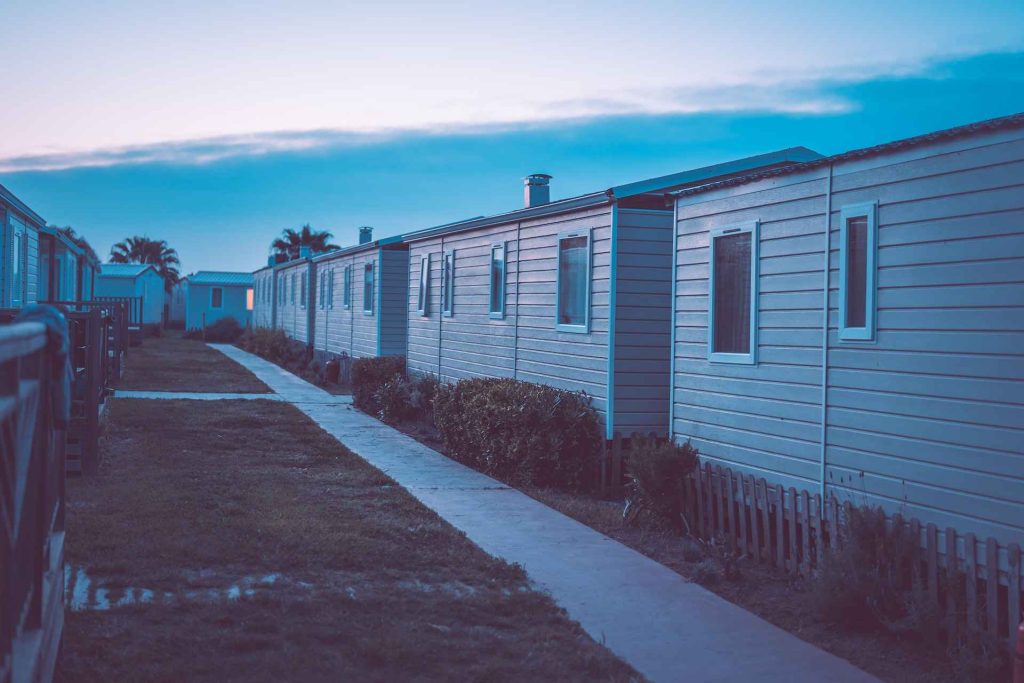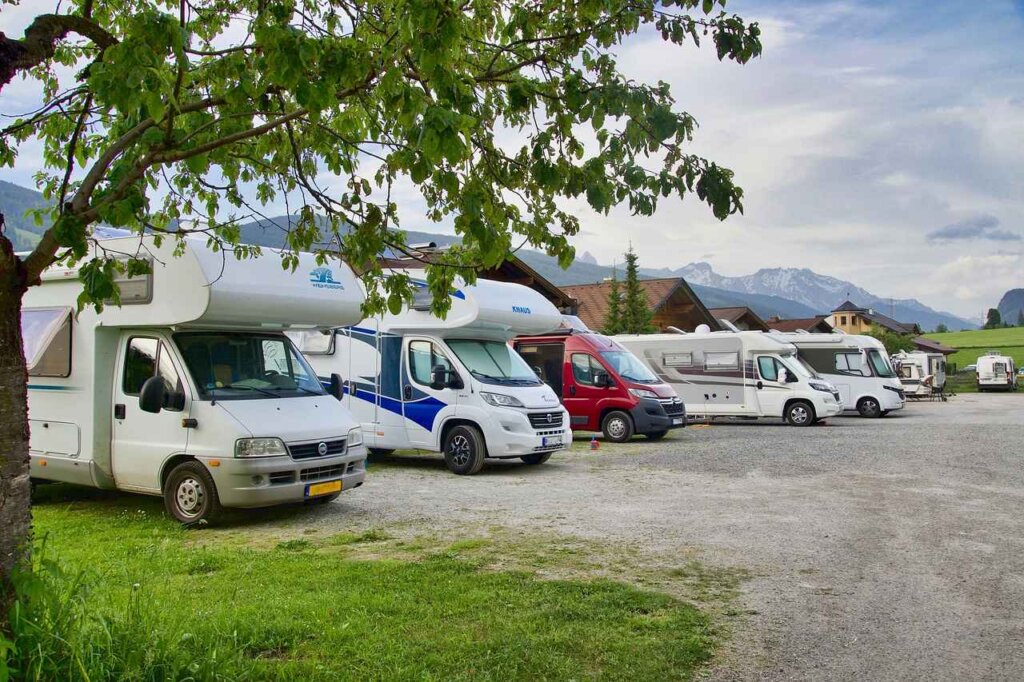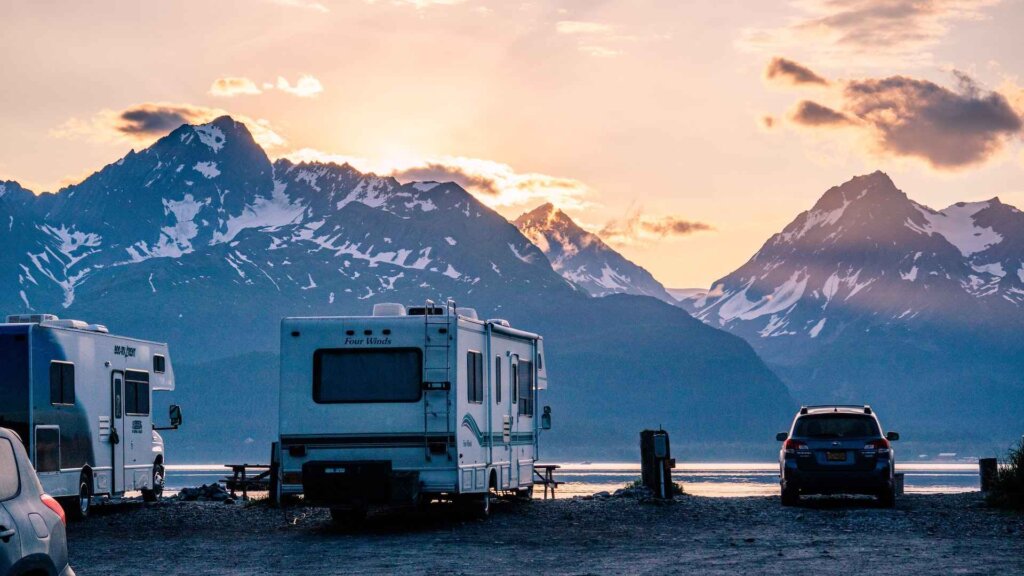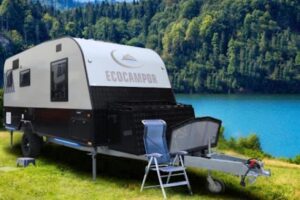Over time, as the RV industry diversified and a plethora of recreational vehicles and mobile dwellings hit the consumer market, the definition of these terms split, with motorhome eventually referring to one thing, and mobile home meaning something else.
So, what’s the difference then?
In short, a motorhome is a recreational vehicle and a mobile home is not. Motorhomes are intended for travel and recreation. Especially good for solo vacations. They can be driven long distances, through a variety of environments, and parked (with permission!) just about anywhere for camping. They are fun, versatile, self-propelled vehicles.
Mobile homes on the other hand, are semi-mobile, semi-permanent houses. Mobile homes have a solid chassis that can be utilized to move the house from location to location as needed, but are not considered vehicles, and are not self-propelled. Once parked, mobile homes move infrequently, if ever.
This article aims to inform you of the primary differences between a motorhome and a mobile home, what varieties are available to consumers, and the ideal uses for both. I’ll go over some pros and cons of each, and what you should consider if you are thinking about buying a motorhome or mobile home.
What is a mobile home?
Mobile homes are factory-made houses, designed to be transported to their final resting places directly from the factory.

Most commonly known as “trailers”, mobile homes are the houses that fill trailer parks across America. They are often indistinguishable from one another, with many trailer parks being filled with identical models from one manufacturer. Because of their factory-made status, sometimes they are simply called manufactured homes, prefabricated homes, or “prefabs”.
Moving a mobile home requires the use of a large flatbed truck and the services of a professional house moving company. Unfortunately, it’s not as simple as just hitching the mobile home to a truck and taking off.
Mobile homes are extremely heavy, and fragile in certain areas. Professional house moving companies have the knowledge, equipment, and experience necessary to safely move a prefabricated home. They also have connections to subcontractors such as transport and logistics companies that assist with route planning and a safe execution of the drive itself.
Types of mobile homes
There are really only two main varieties of mobile homes, singlewide and doublewide. These names refer to the size and shape of the footprint of the building. Singlewides are the cheapest and most prevalent manufactured homes on the market with average dimensions of 15 feet wide and 72 feet long.
Not all singlewides are the same size though, with some as large as 18’x80′ and others as small as 14’x56′. The larger a singlewide trailer is, the more a buyer can expect it to cost.
Doublewides are just as they sound, the same length as a singlewide, but twice as wide. So, while you can expect the length of a doublewide to still fall in the 56′-80′ range, the widths will land somewhere in the 20′-36′ range. Imagine smushing two singlewides together and removing the middle wall, that’s a doublewide.

Uncommon but not unheard of, another configuration of prefabbed home is called a multi-section manufactured home. These trailers are either triplewide, or have a unique configuration that distinguishes them from single or doublewide trailers.
What is a motorhome?
A motorhome is a recreational vehicle. While motorhomes are certainly dwellings that are intended to be lived in, they are first and foremost a vehicle that is designed to be driven from place to place in the pursuit of recreation, relaxation, and adventure.
Most motorhome owners use their RV for traveling and camping during vacations and holidays. They drive their motorhome to an RV park or boondocking location and use the RV as a homebase for several days or weeks of camping and exploring.
It’s important to note here that not all RVs are motorhomes. Travel trailers are also recreational vehicles, but due to their lack of engine and inability to self-propel, they are not motorhomes. Amongst veteran RVers, calling a travel trailer a motorhome will get you looks of confusion, scorn, and pity.
Types of motorhomes
Motorhomes are classified by size and shape primarily. The order of the classifications is a bit confusing, so just know that I am going to start with the largest and work down to the smallest.
- Class A motorhomes are the big boys in the RV world and are known as motor coaches or just coaches in some circles. Class A motorhomes are big, luxurious, expensive, and packed full of comforts and amenities. Many call them a true “home away from home”, as they have almost every feature and appliance that can be found in most American houses.
- Class C motorhomes are medium sized campers that split the difference between a class A and class B motorhome. They are decently sized rigs, offer many appliances and amenities, and sleep between 4 and 8 people. Class C motorhomes are easily identified by the double-berth sleeping platform that commonly extends over the cab of the vehicle.

- Class B motorhomes are the smallest motorhomes out on the road. You know all of those folks who sold their stuff and moved into a van? They are living in a class B motorhome. While most class Bs are campervans, other non-van models exist on the market. Class B motorhomes are occasionally called “low-profile” motorhomes, as they are small, discrete, and more maneuverable than larger models.
Teardrop trailers, truck campers, pop up campers, and DIY truck canopy campers are not considered motorhomes.
Motorhome vs mobile home: primary differences
Here is a quick recap of the primary differences between mobile home and motorhomes.
- Motorhomes are recreational vehicles that can move on their own accord. Mobile homes must be moved using a separate vehicle.
- Motorhomes are intended for travel, camping, and adventure. Mobile homes are designed as permanent residences in one location.
- Motorhomes must be insured as a vehicle by an insurance agency. Mobile homes are residences that must follow a Housing and Urban Development (HUD) code, which outlines requirements for energy efficiency and fire safety in manufactured homes.
Pros and cons of each
While generally used for different purposes, some people need quick housing to throw on a piece of land while building a house and must decide between buying a motorhome or a mobile home for that purpose.
With that in mind, here’s a list comparing the pros and cons of motorhomes and mobile homes.
Motorhome pros
- Fully and easily mobile
- Can be used for semi-permanent or temporary residence
- Designed to be lightweight and efficient with storage
- Can be cheap when bought used and refurbished
Motorhome cons
- Very expensive when purchased new
- Less powerful appliances than traditional homes
- Not stable and prone to shaking and bouncing
- Require frequent maintenance to stay drivable and safe
- Depreciate fast
Mobile home pros
- Solid and sit on a stable foundation
- Large footprint with full-sized rooms
- Powerful, residential appliances
- Relatively affordable when compared to traditional houses or even motorhomes
- Depreciate slowly, can appreciate if well maintained and on valuable land
Mobile home cons
- Difficult and expensive to move
- Only designed for permanent housing, not travel
- Not made of high quality building materials
What should you buy?
If you are a nature lover, camper, and adventure enthusiast who is looking for a sweet adventure rig to help get you outdoors, then a motorhome is for you.

If you are still pretty certain that you are not interested in a motorhome but still want to explore RV options, consider buying a travel trailer or truck bed camper. These versatile RVs offer all of the same adventure opportunities without the hassle of worrying about engine maintenance.
Travel trailers and truck campers can both be towed or carried to campsites for use while on holiday, and then deposited back at home once you are back from your trip. Some RVers love this feature as it allows them to use one vehicle to commute to work on the weekdays, and commute to the mountains on weekends.
You should buy a mobile home if you are seeking affordable, medium to long-term housing.
Many people use mobile homes as a cheap alternative to buying a stick-framed house i.e. a traditionally built house. They often will buy a cheap piece of acreage just outside of a big town, plop a manufactured house down on it and call that home.
Others use mobile homes as an opportunity to live in a house on their own land while they spend 3-5 years saving money to build a stick-framed house and develop the rest of their property. While this is absolutely a viable option for this type of situation, I think a large, used travel trailer serves this purpose better.
Frequently Asked Questions
Now that we’ve cleared up the differences between motorhomes and mobile homes, let’s tackle the last few reader questions.
Can I only live in a mobile home in a trailer park?
No, mobile homes can be put on any piece of land and are not limited to trailer parks. Trailer parks are simply the easiest and most affordable route to living in a mobile home.
Can I build my own mobile home?
Sure, there is nothing stopping you from doing that, but it would be a somewhat bizarre project to take on. The cheapest mobile homes are bought straight from the manufacturer.
Are motorhomes and RVs different?
Nope! A motorhome is simply a classification of recreational vehicle (RV). Other classifications of RV include travel trailers and truck bed campers.
Conclusion
Well, by now I hope it’s pretty clear that mobile homes and motorhomes serve very different purposes. Despite their similar name and origin story, they are different enough that honestly it was kind of tough writing an article comparing them. They are so different in form, function, and purpose, that they are hardly comparable.
But, we got through it, and now we all know that people looking to buy an RV shouldn’t consider mobile homes, and those looking for the permanent housing solution that mobile homes provide might not be satisfied in a motorhome.
Both serve their intended purpose well. Neither is better than the other, as they are for different people at different stations in life.
Hold on a second, I never even got to talking about tiny homes… eh, let’s save that for another day, shall we?
Happy camping, friends!



